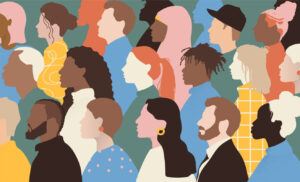Why there aren’t more Black men in PR
Insights from The Museum of PR’s “Celebrating Black PR History 2024: Where Are All the Black Men in Public Relations?”

Black people are underrepresented in the PR industry. While they make up 13.6% of the U.S. population, Black people comprise just 9% of those working in entry-level PR specialist roles. Only 3% of those working in those roles are Black men, according to data provided by Chuck Wallington, executive vice president and chief marketing & communications officer at Cone Health. Those numbers significantly decrease as you move higher in an organization, becoming whiter with each additional rung of the career ladder.
“In just about every organization I’ve worked for, I’ve gone through the doors; I’ve been very, very happy to be there,” Wallington said during The Museum of PR’s recent “Celebrating Black PR History 2024: Where Are All the Black Men in Public Relations?” “And I’ve looked around, and maybe there was one other person who looked like me, that was most likely a black female, but there were very, very, very few black men in the field.”
That lack of representation matters.
“Public relations is defined by bringing the best ideas to the table. And if those ideas are not represented in this fullest, diverse sense as possible, then we’re not bringing the fullest ideas to the table,” said panelist David W. Brown, assistant dean of community and communication at Temple University.
But why are Black men such a rarity in the PR field?
While conducting research for his master’s degree, Wallington identified three key factors that reduce the number of Black men entering the field. During of The Museum of PR’s presentation, Wallington and a panel of Black, male PR practitioners talked through these issues and how it’s impacted their own careers.
- High school students don’t understand – or even know about — the profession.
You can’t enter a field if you don’t even know what it is. That’s one simple barrier to entry that begins before college applications even begin. “Before you even get to college, young men just don’t have an understanding of what the profession is at all about,” Wallington said. “And as you know, without that early awareness, folks are just not going to be successful when they go into the field, it’s hard to attract people into the field. And when they get there, they tend to flounder around.”
That lack of awareness resonated with Brown. He initially wanted to be a journalist, but discovered during his studies there was another option.
“I heard about this thing called PR, and they say they make more money out of it, I was like ‘oh! Well, I’ll pursue that.’ But not even knowing that was a path.”
- A lack of mentors.
The next barrier becomes a self-perpetuating cycle. Because Black men have so few role models who look like them in the industry, it can be hard to see themselves there. It can also be hard to understand how to thrive in an environment where most people look and act differently from you without a guide.
“There’s a shortage of colleagues, especially Black men, who can be mentors, who can be sponsors, who can be role models, who can be allies,” Wallington said. “What when this happens, Black men feel alone, they feel isolated, there’s no one else there who can relate to them in their experiences and their journeys.”
While Black men who can serve as mentors may be rare in the industry, they aren’t the only ones who can help lift up this demographic and help them thrive in their careers. That’s where allyship comes into play.
“Mentorship need not be a singular role,” Brown said. “Many people can mentor. I often tell folks who are coming up, get yourself a board of advisors, because different people can play different roles that can help you. Some can be advocates, some can be allies, some can be the crying board, because sometimes we just need to yell and cuss at the moon, that’s OK. Because sometimes you need to find those spaces. And if those spaces don’t exist, you have to create those spaces.”
- Black men can be perceived as intimidating.
Whether conscious or not, racism does play a role in the obstacles that can prevent a Black man from thriving in the PR industry.
Research shows that Americans consider Black men to be more threatening than other people, even if they are the same size. This can have grave implications on everything from how police interact with Black men to how they must learn to navigate in the white and often female-dominated public relations industry.
“I have been in spaces where someone would say that because of my voice, I’m intimidating,” Brown said. “Or that if I’m trying to make a point, that I’m being forceful. Adjectives that are just kind of loaded…if it’s somewhere else, they might be viewed as being assertive.”
But while these perceptions can be difficult to deal with, the men on the panel stressed that their identity is not a liability.
“Our black maleness is a superpower, that duality is a superpower,” Brown said. The key is knowing when to wear that superhero cape and when to don a suit jacket to succeed in the world of PR.
Watch the full panel below.
Allison Carter is editor-in-chief of PR Daily. Follow her on Twitter or LinkedIn.








Fear is a HUGE barrier to Black men even being considered for positions in the PR world. I been involved with several campaigns where people not only were surprised that I was involved, they were shocked that I even led the campaign. We all need to do a better job of communicating with people who may be different than us, if only to hear a diverse opinion.
WGB